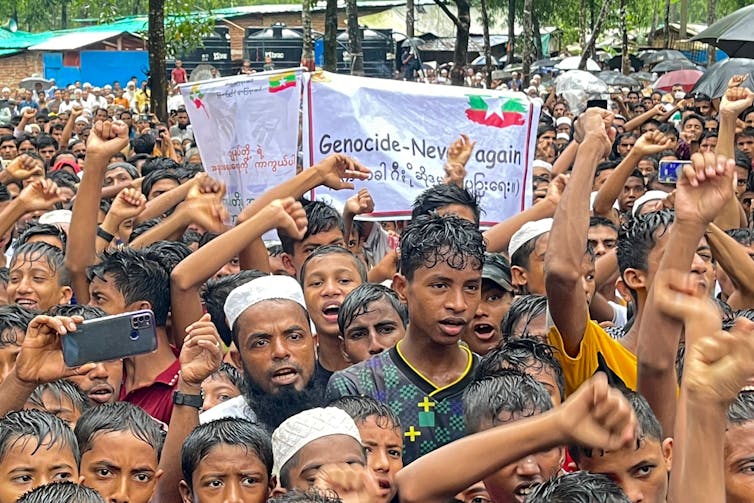World leaders will gather at the United Nations on Sept. 22-23, 2024, where they are set to adopt the Pact for the Future – an ambitious plan for how to best reform the U.N., and other institutions, to address the current problems of the world and protect future generations.
It couldn’t come at a more pressing time. As presidents, prime ministers and top diplomats prepare to meet in New York, mass atrocities – genocide, war crimes, crimes against humanity and ethnic cleansing – are taking place or alleged in several countries around the world.
The pact and an accompanying Summit of the Future serve as an opportunity for the U.N. to make structural changes that will better empower the international body to prevent and respond to such crimes and protect populations under threat. As U.N. Secretary-General António Guterres noted, the summit is a “once-in-a-generation opportunity to reinvigorate global action, recommit to fundamental principles, and further develop the frameworks of multilateralism so they are fit for the future.”
As a scholar-practitioner of mass atrocities prevention and human rights, I share Guterres’ hope that the summit and pact can lead to a change. The existing frameworks have failed time and time again to prevent or end mass atrocities.
But to have a real chance of success, I believe the summit will have to look at reforming the U.N.’s principal body on peace and security: the Security Council. The council is not only unrepresentative, but its five permanent members – France, the United Kingdom, United States, Russia and China – all stand accused of being directly or indirectly complicit in some of the worst mass atrocities currently taking place.
A forgotten responsibility
The Summit for the Future comes nearly 20 years after the last major push for U.N. reform at the 2005 World Summit. Staged in the aftermath of genocides in Rwanda and Srebrenica, the summit saw 170 governments adopt the Responsibility to Protect, or R2P, pledging to take on individual responsibility to protect their own populations from mass atrocities.
States also accepted collective responsibility to protect people in other countries. In cases when a nation fails to prevent mass atrocities, or commits them directly, world leaders agreed to “take collective action, in a timely and decisive manner, through the Security Council.” Such actions could include everything from sanctions and arms embargoes to coercive military action.
Two decades on, it is clear that U.N. member states and the Security Council have failed to live up to their commitment to R2P. In the intervening years, the world has seen mass atrocities in Sudan, South Sudan, China, Ethiopia, Yemen, Myanmar and Syria – with limited effective interventions by the U.N.
Perpetrators or protectors?
Part of the problem, I believe, is with the Security Council itself. Not only has this crucial body not ensured populations were protected, but that task is undermined by the fact that all five permanent members of the Security Council are either accused of directly committing or assisting mass atrocities.
China has been accused of committing genocide and crimes against humanity against its Uyghur ethnic minority. Russia has been accused of committing war crimes, crimes against humanity and genocide in Ukraine.
Both China and Russia supply arms to regimes in Syria and Myanmar – both accused of committing mass atrocities.
The United States, United Kingdom and France – the three permanent Western members on the council – have armed, and continue to arm, Israel, which has been accused of committing genocide, war crimes and crimes against humanity in Gaza and the West Bank.
Such complicity undermines the authority of the Security Council as the U.N. body charged with taking action to prevent and respond to mass atrocities. Additionally, the five permanent members have veto power, unlike the 10 rotating nonpermanent members of the council. This means whenever one of the permanent members votes no on a Security Council resolution, it does not pass.

Tanbir Miraj/AFP via Getty Images
Since the Responsibility to Protect was adopted, the veto has been used to block action on mass atrocities several times. Russia and China have used their veto to block action in cases related to the crisis in Syria. Meanwhile, the U.S. has repeatedly vetoed action over Israel’s treatment of Palestinians in the occupied territories.
The power to veto also acts as a deterrent, preventing issues from being brought before the Security Council. If member states believe a permanent member will block a resolution, they may decide not to bring the issue before the council for a vote.
Vetoing the veto
The idea of reforming the council so that the five permanent members do not have veto powers on resolutions related to mass atrocities is not new.
It gained traction in 2013 after France’s then-President François Hollande addressed the U.N. General Assembly and stated that “whenever [the United Nations] proves to be powerless, it’s peace that pays the price.” Hollande called for a “code of good conduct” whereby the permanent members could decide to “collectively renounce their veto powers” regarding mass atrocities.
In 2015, Mexico joined France in formally calling for the suspension of veto powers in such cases. As of 2023, 106 states have expressed support for this effort.
Separately in 2015, the Accountability, Coherence and Transparency Group – 27 states that work to enhance the Security Council’s effectiveness – proposed a “Code of Conduct on Genocide, Crimes against Humanity and War Crimes.” It called on states to “voluntarily commit themselves not to vote against a draft resolution of the Security Council in which the Council takes measures to end these crimes.” The key difference between the two proposals is that the ACT Group’s code of conduct would apply to both permanent and nonpermanent members of the Security Council. As of 2023, 129 U.N. members and observers have signed.
The issue of the Security Council veto has come up during the drafting of the Pact for the Future.
An earlier version of the draft pact held that member states “encourage a collective and voluntary agreement among the permanent members of the Security Council to refrain from the use of the veto when the Security Council intends to take action to prevent or halt genocide, crimes against humanity or war crimes.”
But this paragraph was removed in a subsequent revision.
The latest version due to be discussed at the summit references the need to address veto reform and “intensify efforts to reach an agreement on the future of the veto, including discussions on limiting its scope and use.”
But achieving true veto reform has proven difficult in the past, as permanent members have been reluctant to relinquish this extraordinary power.
Less representative, but no less power
The veto debate forms part of a larger discussion that many states, especially in the Global South, want to have over the shape of the U.N.’s highest body.
Next year will mark the 80th anniversary of the founding of the United Nations. In the conferences that preceded the creation of the U.N., the allied victors of World War II negotiated to give themselves permanent membership on the Security Council and veto power.
But the world looks very different today than it did in 1945. The five permanent members are no longer all allies, and membership of the U.N. has grown significantly from 51 original members to 193 members today.
As the U.N. has grown, it has added more members to the Security Council, expanding from 11 to 15 members in 1963.
But the number of permanent members has not changed. And while in 1945 they represented close to half the world’s population and 10% of member states, that has dwindled to about a quarter and 2.5%, respectively.
Despite becoming less representative, this five-member club still has the power – should it find the willingness to use it – to exert pressure to end many mass atrocities that are causing incredible suffering and death and driving the highest level of global displacement in history, with more than 120 million people forcibly displaced in 2024.
But it has failed to do so. And while there are several challenges that need to be addressed in the Pact for the Future, any efforts to safeguard the safety of peoples now and in the future will be undermined without reform of the Security Council and its veto powers.![]()
Mike Brand, Adjunct Professor of Genocide Studies and Human Rights, University of Connecticut
This article is republished from The Conversation under a Creative Commons license. Read the original article.











